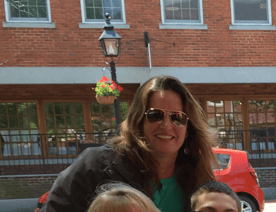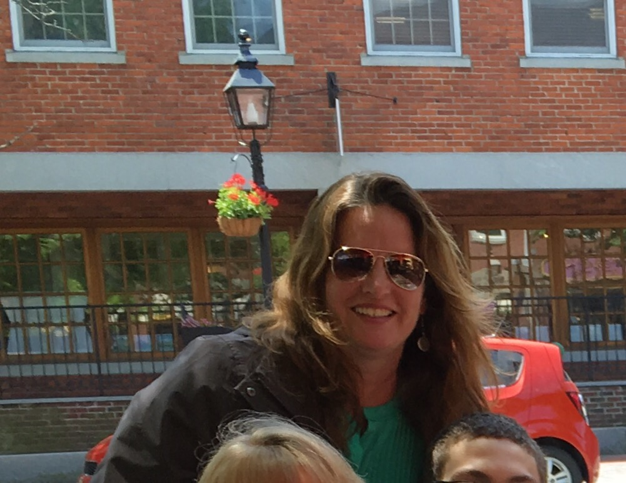Interviews from the Field: Sarah Scruton
Sarah Scruton is an English teacher at Triton Regional High School in Byfield, MA. Although Sarah is a general education teacher, she provides excellent insight into how to make accommodations for students with special needs within an inclusive classroom, the pros and cons of being a teacher, alternative assessment, and advice for future educators. Furthermore, Sarah strongly believes that if a student is separated from the classroom due to their learning needs, they are also being separated from the overall school culture.
 Sarah graduated from Gordon College with a bachelor’s degree in English, and minored in Secondary Education. Her first teaching experience out of college was at an academic support center at Acton-Boxborough High School, where she worked with English Language Learners and struggling readers. Inspired by the work she was doing, she pursued her Master’s Degree from UMASS Lowell. In 2004, she began working at Triton Regional High School, where she has been teaching since. In addition, she has a CAGS (Certificate of Advanced Graduate Studies) in Leadership.
Sarah graduated from Gordon College with a bachelor’s degree in English, and minored in Secondary Education. Her first teaching experience out of college was at an academic support center at Acton-Boxborough High School, where she worked with English Language Learners and struggling readers. Inspired by the work she was doing, she pursued her Master’s Degree from UMASS Lowell. In 2004, she began working at Triton Regional High School, where she has been teaching since. In addition, she has a CAGS (Certificate of Advanced Graduate Studies) in Leadership.
Q: What made you decide to be a high school teacher? Did you always want to be a teacher?
A: I think I always wanted to be a teacher. I had a great high school experience and loved my English teachers, and although I really like younger kids, I couldn’t see myself in an elementary school setting.
Q: Is there any one moment with a child during your time as a teacher that has stuck with you?
A: One of my first years teaching at Triton I had a student who had a reputation as being a rough kid, who had no desire to learn, was disrespectful; the list went on and on. I expected a monster in class, but instead had a beautiful, petite girl sitting in front of me. I assumed teachers had mixed her up with someone else. Early in the year she was diagnosed with ADHD and I had no idea what that meant in the classroom because the diagnosis was in its early years. I bought books and did research to figure out how to help her. She was attentive, she worked hard for me, and together we battled school rules that conflicted with research I had been doing for students with ADD and ADHD-like headphones and walking around. She passed English that year and made me a better teacher. Those are the kids I think that make you most realize why you do what you do.
Q: How do you make accommodations for students that have special needs in your classroom?
A: Open and regular communication is the only way to have a success in your class with students who have special needs. One thing I promote is self-advocating. There is a short amount of time to help kids develop that skill before they go out to college or the work place. I am fortunate that I can tell kids, “Listen, you know what works for you, let me know and that is how we will go forward.” For parents, I know that navigating school with a student with special needs is exhausting and that their first response is sometimes becoming defensive, so I take the time to cultivate that relationship.
Q: What do you view as the biggest challenge for this age group in terms of students with special needs?
A: The social piece is a huge factor with teenagers. No one wants to be seen as different, and often I have found kids make choices based on what friends are doing with their time versus what they need in order to get things done. Helping students achieve a balance is tough. Also, students with special needs can be easily isolated, especially when anxiety is a piece of their story. Students who are separated because of their needs can also be left out of the bigger school picture.
Q: Do you have experience with students who have autism in your classroom? How did you make accommodations to best fit their needs?
A: I have had students on the Autism Spectrum. My very good friend has a son on the spectrum and I have started to approach my similar students like “Would this be what Deb would want for John? Would she be frustrated if John was in my class?” For most of my students, it’s a matter of helping them navigate social cues and how to work through responses that may be inappropriate. It is also helping the other students in the room respond appropriately. I think that is as much a teacher’s job as curriculum accommodations.
Q: Do you have any experience with children that have special needs outside of the classroom? Have you had any insights into the special education field through them?
A: I think once people know you are in education, they draw you into their worlds, especially if their child is struggling. As I said, I do have a good friend who regularly fights for her child, which has made me so empathetic to the needs of parents.
Q: What do you view as the most challenging part of accommodating your classroom to benefit all students?
A: One of the struggles that I know many teachers have is that, especially with our juniors and seniors, accommodations may hinder a student later in their academic career. The release of responsibility from the teacher to the student is a delicate balance to strike. How can you as a teacher get students to take more ownership of their education and not see a drop in a grade as part of a process and not a need to panic.
Q: What is the most challenging part of your job overall?
A: The changing demands on teachers from outside the classroom. There is so much that is being asked of teachers, and from different people, so it becomes difficult, sometimes redundant, when you are serving many masters. I think that the idea that teachers suddenly don’t know what they are doing or are failing the students is another challenge. Of course, there are people not getting the job done, but that isn’t the majority.
Q: What is the most rewarding part of your job?
A: Everything else! The students, my colleagues, they are all great and so much fun to work with and to teach. The brains that get together to solve a problem or try new ideas are amazing to me. The English department, which honestly is the best department at Triton, is always trying to work together to improve our students’ experiences. Recently we have started using portfolios to assess students. It has been a very effective way to reach all of our students and see their progress. And every student can access it. It is this kind of exciting stuff that makes teaching worth doing; hard, but worth doing.
Q: What changes have you seen in the education field in the last 10 years?
A: The increased number of students with social/emotional needs that impact their ability to learn is probably the biggest change that I have seen in the last few years. There are a hundred reasons why, but the reality is, teachers have to figure out how to best help them. How do we get this student to class? How do we accommodate for tests? How do we help students change behaviors? And of course, every case is different so every solution must be individualized.
Q: What changes do you hope to see within the education and/or special education fields within the next 5-10 years?
A: I would love to see people stop trying to apply business models to education. We are developing brains, not widgets. We spend so much time creating data, but not enough time working on best teaching practices. I think that the pendulum will swing back towards teachers being trusted to make the right decisions.
Q: As a general education teacher, what is one thing you would like to share to the parents of children with special needs?
A: I can’t say enough about the need to communicate. I know that every year must feel like they are starting over, but parents know best what has worked in the class for their kids. Teachers are willing to work with parents because in the end, we all want kids to succeed.
Q: Lastly, do you have any advice for aspiring teachers?
A: Trust your instincts. Sometimes I just know that this is what a student needs, and yes that comes from experience, but even when I was first starting out this would be the case. Make sure you have research to back up your decisions if your choices go against the grain, but you must advocate for what is best for your kids. Don’t be afraid to stop something that isn’t working, even if it is in the middle of a lesson. This is a scary thing to do, but it is a great example for kids to see you switch gears if things aren’t turning out the way you planned.

Kasey Salvatore
Kasey Salvatore is currently an undergraduate student at Lesley University majoring in special education and global studies. Her passion for special education was initially sparked at an early age through experiences with friends and family. More specifically, her mother was a special education teacher and therefore Kasey was introduced to the field throughout her childhood. Additionally, she has experience with children who have special needs through student teaching, friendships and volunteer opportunities. She also currently cares for a 5-year-old boy who has autism and a rare genetic disorder. Kasey’s ultimate goal is to work with children who have autism in an educational or therapeutic setting. In her spare time, Kasey can be found writing, drawing or spending time with friends and family.




